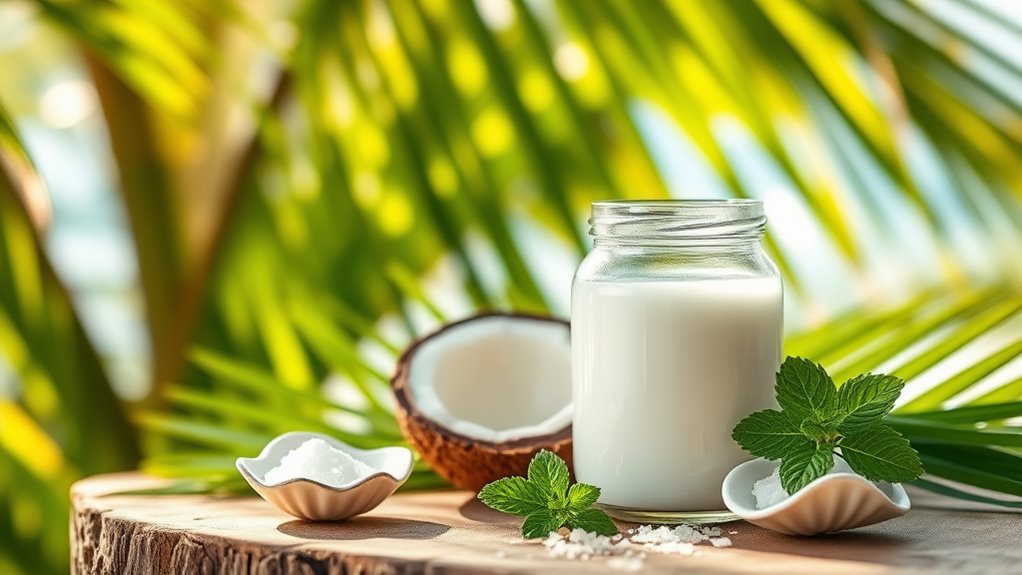This Coconut Oil Trick Might Improve Oral Health
If you’re looking for a simple way to boost your oral health, coconut oil pulling might be worth considering. This practice involves swishing coconut oil in your mouth for a few minutes each day, leveraging its natural antibacterial properties. It’s not just about freshening your breath; this method could offer deeper benefits for your gums and overall oral microbiome. Curious about how it works and what you can expect? Let’s explore the details.
Key Takeaways
- Coconut oil pulling for 15-20 minutes daily helps remove toxins and bacteria, enhancing overall oral hygiene.
- Lauric acid in coconut oil targets harmful bacteria, reducing plaque and preventing gum disease.
- Regular oil pulling promotes fresher breath by eliminating odor-causing microorganisms in the mouth.
- The practice can lead to healthier gums by decreasing inflammation and minimizing the risk of infections.
- Incorporating coconut oil into your routine can naturally whiten teeth over time and support oral health.
Understanding Coconut Oil Pulling
Coconut oil pulling is an ancient practice gaining popularity in modern oral health routines.
This method involves swishing a tablespoon of coconut oil in your mouth for about 15-20 minutes daily.
It’s believed to help remove toxins and bacteria, potentially leading to healthier gums and fresher breath.
While it’s not a replacement for regular brushing and flossing, incorporating coconut oil pulling into your routine can enhance your oral hygiene efforts.
Many people find it easy to integrate, and the natural properties of coconut oil can offer additional benefits, making it a worthwhile addition to your overall wellness regimen. Regular oil pulling can reduce plaque formation and gingivitis symptoms, further supporting your dental health.
The Science Behind Oral Health Benefits
How can something as simple as swishing oil in your mouth lead to significant oral health benefits?
The science behind this practice lies in the antibacterial properties of coconut oil.
It contains lauric acid, which effectively targets harmful bacteria in your mouth, reducing plaque and preventing gum disease.
Additionally, oil pulling may help in reducing bad breath by eliminating odor-causing microorganisms.
This natural method also promotes saliva production, aiding in the neutralization of acids and maintaining a balanced oral environment. Regular use of coconut oil can support a healthier oral microbiome, enhancing overall oral health.
How to Practice Coconut Oil Pulling
Coconut oil pulling offers numerous benefits for your oral health, from reducing plaque to freshening breath. To get started, follow a simple step-by-step guide that guarantees effective practice. Additionally, choosing the right type of coconut oil can enhance your experience and results. Regular oil pulling with coconut oil may help reduce harmful bacteria and improve gum health.
Benefits of Oil Pulling
Oil pulling, an ancient practice rooted in Ayurvedic medicine, offers numerous benefits for oral health. By swishing coconut oil in your mouth, you can enhance your overall dental hygiene. Here’s a quick look at some of the key benefits:
| Benefit | Description | Impact |
|---|---|---|
| Reduces Plaque | Helps eliminate harmful bacteria | Healthier gums |
| Freshens Breath | Neutralizes odor-causing bacteria | Improved confidence |
| Whitens Teeth | Natural whitening effect | Brighter smile |
| Fights Cavities | Prevents tooth decay | Stronger teeth |
| Improves Gum Health | Reduces inflammation and bleeding | Healthier gums overall |
Step-by-Step Guide
To effectively practice oil pulling with coconut oil, follow these simple steps to maximize its oral health benefits.
Start with one tablespoon of coconut oil.
Swish it around your mouth for 15 to 20 minutes, making sure to pull it through your teeth.
Avoid swallowing the oil, as it contains toxins and bacteria.
After the time is up, spit the oil into a trash can to prevent plumbing issues.
Rinse your mouth thoroughly with warm water, then brush your teeth as usual.
Aim to practice this daily, ideally on an empty stomach, for best results in your oral hygiene routine.
Recommended Coconut Oil Types
When selecting the right type of coconut oil for oil pulling, it’s essential to choose high-quality options that offer the best health benefits.
Look for organic, unrefined, and cold-pressed coconut oil, as these types retain essential nutrients and beneficial properties.
Extra virgin coconut oil is another excellent choice, providing a rich source of lauric acid, which has antimicrobial effects.
Avoid refined coconut oils, as they may contain additives and lose their natural health benefits during processing.
Potential Impact on Bad Breath
Coconut oil possesses antimicrobial properties that can reduce harmful bacteria in your mouth. When you swish it around, known as oil pulling, it helps to dislodge food particles and plaque, which are often culprits behind bad breath. Additionally, coconut oil can neutralize volatile sulfur compounds responsible for unpleasant odors. By incorporating this natural remedy into your oral hygiene routine, you may experience fresher breath. Studies confirm significant reduction of harmful bacteria in the mouth, enhancing the effectiveness of oil pulling.
Coconut Oil and Gum Health
Coconut oil’s antimicrobial properties can greatly benefit your gum health by reducing harmful bacteria in your mouth.
When you practice oil pulling, you’re not just freshening your breath; you’re also promoting healthier gums by decreasing inflammation and plaque buildup. Additionally, oil pulling may naturally whiten teeth over time, enhancing your overall oral aesthetic.
Incorporating this simple routine into your oral care can lead to long-term improvements in gum health.
Antimicrobial Properties Explained
The antimicrobial properties of coconut oil play a crucial role in promoting gum health.
When you incorporate coconut oil into your oral care routine, its lauric acid content helps combat harmful bacteria that can cause gum disease.
This natural oil disrupts bacterial cell membranes, reducing harmful microorganisms in your mouth.
By minimizing bacteria, you’re not only protecting your gums but also enhancing your overall oral environment.
Regular use can lead to healthier gums, reducing inflammation and the risk of infections.
Embracing coconut oil can be a simple yet effective way to support your gum health without harmful chemicals.
Oil Pulling Benefits
Incorporating oil pulling into your oral hygiene routine can amplify the benefits of coconut oil for gum health.
This ancient practice involves swishing coconut oil in your mouth for 15-20 minutes, effectively reducing harmful bacteria and plaque.
Research suggests that oil pulling can help decrease gum inflammation, leading to healthier gums and fresher breath.
As you swish, the oil binds to toxins and bacteria, which are then eliminated when you spit it out.
Regularly practicing oil pulling may also enhance overall oral health, complementing brushing and flossing and offering a natural approach to maintaining your gums.
Incorporating Coconut Oil Into Your Routine
How can you seamlessly add coconut oil to your daily oral hygiene routine?
Start by incorporating oil pulling into your morning ritual. Swish a tablespoon of coconut oil in your mouth for 10-15 minutes before brushing your teeth. This helps remove bacteria and promotes fresh breath. Research shows reduction of harmful bacteria associated with oil pulling, enhancing its effectiveness.
You can also use coconut oil as a natural toothpaste alternative; simply mix it with baking soda and essential oils.
Additionally, consider using it as a mouthwash after brushing.
Remember to choose organic, extra virgin coconut oil for maximum benefits.




